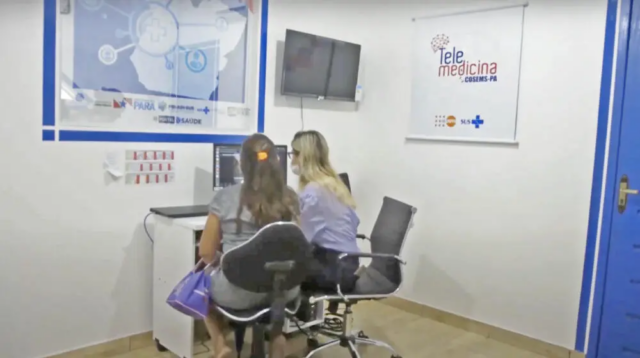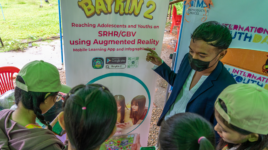Ending unmet need for family planning in a world of 8 billion: The innovations enabling access for all


Leiliana Pereira at a virtual appointment with a gynecologist at one of Saúde das Manas’ outposts in Portel, Brazil. © UNFPA Brazil
YANGON, Myanmar/PORTEL, Brazil – Access to contraceptives and family planning has long been a complicated matter. But the COVID-19 pandemic made matters worse.
According to UNFPA research, disruptions in access to family planning services and supplies led 12 million women in 115 countries to lose access to birth control – and to as many as 1.4 million unplanned pregnancies.
For many, the coronavirus crisis reinforced the need for innovative solutions to the global problem of unmet need for modern family planning. Around the world, UNFPA met this urgent necessity with invention. Below, check out two new technological tools helping to accelerate UNFPA’s progress towards achieving universal family planning – for all 8 billion people now officially on the planet.
Saúde das Manas
Even before the COVID-19 pandemic caused widespread disruptions to the provision of sexual and reproductive health services, some communities had little to no access to regular care.
In fact, visits from gynecologists had been so rare in some communities of Brazil’s Pará state that one resident said many women don’t know what they are. “It was only in 2011 that I learned that gynecologists existed,” Leiliana Pereira told UNFPA.
This could change, however, following the introduction of a new telemedical service launched in August 2020 by UNFPA and the Pará Council of Municipal Health Departments called Saúde das Manas, or Sisters’ Health.
Sisters’ Health connects women and girls in hard-to-reach areas with telemedical sexual and reproductive health care, enabling access to services like prenatal consultations, gynecological cancer screenings and family planning. The project now operates across 13 municipalities in Pará – a state encompassed by Brazil’s Amazon region, which has struggled to reduce its maternal mortality rate.
In and around Portel, a city in Pará, taboos surrounding family planning run deep and misinformation is hard to squash. Ms. Pereira, who lives in Portel, said many in her community, especially those in the countryside, lack adequate information about contraceptives. The mother-of-five was 17 when she had her first child. “It was not planned – it happened,” she said.
Earlier this year, she went for an appointment with a gynecologist at one of Saúde das Manas’ outposts in Portel with the objective of restarting use of contraceptives. Seated next to telemedicina nurse Stephanie Monteiro in her hometown, Ms. Pereira video chatted with a physician.
She is one of nearly 14,000 women that Saúde das Manas has reached. And with the project’s organizers exploring the possibility of expansion, she will not be the last.
“I hope that this continues, not only for me but for all women who need a doctor,” Ms. Pereira said. “The gynecologist is the women’s doctor because they know our needs.”
Baykin 2
Similar concerns were seen in Thura’s community in Myanmar. “There is social stigma existing in our community to speak about sexual and reproductive health, especially concerning adolescents and youth. People are too shy to talk about it,” says the 15-year-old girl.
And like in Brazil, taboos were just one obstacle getting in the way of access to sexual and reproductive health information. Before the COVID-19 pandemic, UNFPA collaborated with partners to facilitate in-person awareness sessions on such issues. But after the virus began its global spread and Myanmar’s political instability led to restrictions on young people’s movements, these conversations were forced to migrate to a safer space – online.
Enter the Baykin 2 app: a virtual learning platform designed to introduce young people in Myanmar to critical information on sexual and reproductive health and rights, gender equality, gender-based violence and other subjects.

Young people join the orientation session of Baykin-2 mobile application. © UNFPA Myanmar
“For some young people, they feel comfortable and safe via this virtual platform and raise their issues openly for our support. We are so happy to see their interest and active participation going forward,” says Marie Stope Myanmar Programme Coordinator Aung Pike Tun.
The Baykin 2 app was designed to introduce adolescents and young people in Myanmar to key topics on sexual and reproductive health, gender equality and gender-based violence, among other topics. Games and visuals help adolescents learn about their bodies and rights.
Since its official launch in June 2022, Baykin 2’s user base has significantly expanded, according to UNFPA Myanmar. Half of its users are 10-24 years old; meanwhile some parents have created accounts for their children.
Baykin’s English translation is “being safe”, which matches the ultimate goal of the app – to help young people gain the knowledge they need to exercise their rights and avoid the risk of unintended pregnancy, unsafe abortion, gender-based violence and other life threatening complications.
“Sexual and reproductive health information saves the lives and future of young people,” says 23-year-old Mya Kalyar Kyaw. “This is not a luxury. This is our fundamental right.”

